I wouldn’t say I cry easily. Sure, I cry at movies and I cry sometimes when I read the news. And I can cry when I feel inexplicable happiness. (I love it when THAT happens.) Or sadness. But often, when others around me are crying, I’m dry-eyed. Maybe going public will help diminish the one trigger that turns me into a complete, blubbering cry-baby—embarrassingly so. In fact, I usually show up for my “cry” in a big, floppy hat wearing sunglasses.
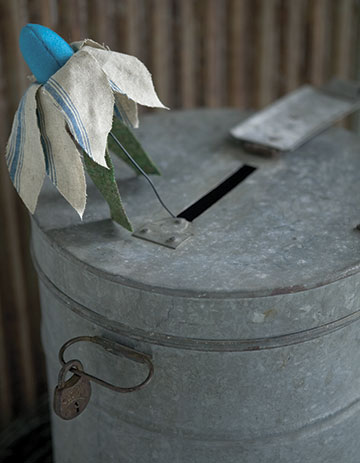
Casting my ballot does it every time. The minute I pull into the parking lot to exercise my right to vote, that tight feeling starts in my chest, heads up to my nose, then out my eyes like a cloudburst that can’t be stopped. The only explanation I’ve come up with goes something like this: Some of my ancestors, on my mother’s side, were suffragists. It was illegal for them to do what I get to do: vote (or even to hold public office). Instead, they were thrown into jail or suffered persecution, even bodily harm. Their desire to vote turned them into outcasts. In some cases, it ruined their marriages, their lives. Somehow, in an unscientific DNA kind of way, they are still here, with me, of me. They want me to know; they want me to FEEL.
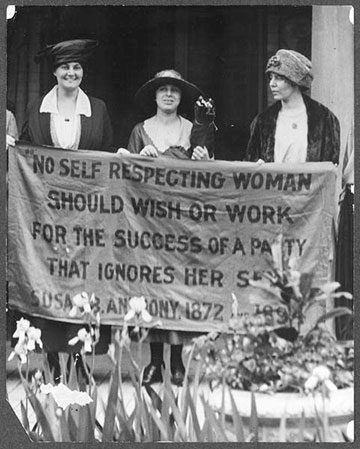
Photograph of Kenyon Hayden Rector, Mary Dubrow, and Alice Paul standing outside the 1920 Republican Convention in Chicago and holding a banner. Courtesy of Wikimedia Commons. National Photo Co.
Boy, howdy. For all the tension that exists surrounding who to vote for, who will win, who is honest, who isn’t, whether voting matters, the red and the blue, and ballots gone missing, I am completely without judgment in that moment. Not before or after, mind you, but walking into that booth, surrounded by so many people, people going out of their way to come, all of us together, all of us doing one thing, the same thing, I am moved to a sentimentality much bigger than me and my singular vote.
So, there you have it—earning my little “I Voted” sticker is quite an ordeal for me. Sir Winston Churchill once said, “The best argument against democracy is a five-minute conversation with the average voter.” Or one look at me. Seriously, someone in my past STRONGLY believed that voting is a civic sacrament, a thing of mysterious and sacred significance, and that I needed to feel the rapture of its baptism over and over again.
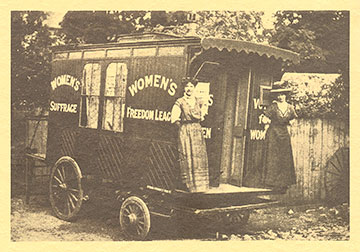
_____________________________________________________________________________________
Why Women Should Vote (from e-mail circular)
Do you know the story … of our mothers and grandmothers who lived only 90 years ago? Remember, it was not until 1920 that women were granted the right to go to the polls and vote.
Beginning in early 1917, a small but determined group of militant suffragists led by Alice Paul began picketing the White House, urging Woodrow Wilson to support a Constitutional amendment to give women the right to vote.
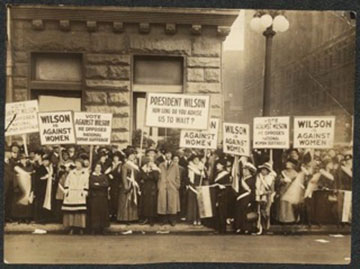
Women, go your ways! Seek not to beguile us of our imperial privileges. Content yourself with your little feminine trifles—your babies, your benevolent societies and your knitting—and let your natural bosses do the voting. Stand back—you will be wanting to go to war next. We will let you teach school as much as you want to, and we will pay you half wages for it, too, but beware! We don’t want you to crowd us too much.
–Mark Twain, 1867

Thus unfolded the “Night of Terror” on Nov. 15, 1917, when the warden at the Occoquan Workhouse in Virginia ordered his guards to “teach a lesson” to the suffragists imprisoned there because they dared to picket Woodrow Wilson’s White House for the right to vote. For weeks, the women’s only water came from an open pail. Their food—all of it colorless slop—was infested with worms.
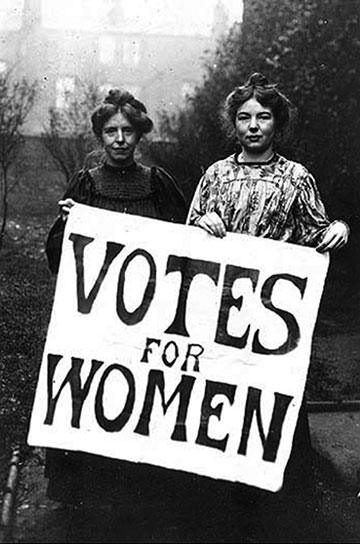
The women were innocent and defenseless, but they were jailed nonetheless for picketing the White House, carrying signs asking for the vote. And by the end of the night, they were barely alive. Forty prison guards wielding clubs and their warden’s blessing went on a rampage against the 33 women wrongly convicted of “obstructing sidewalk traffic.”
They beat Lucy Burns, chained her hands to the cell bars above her head, and left her hanging for the night, bleeding and gasping for air.
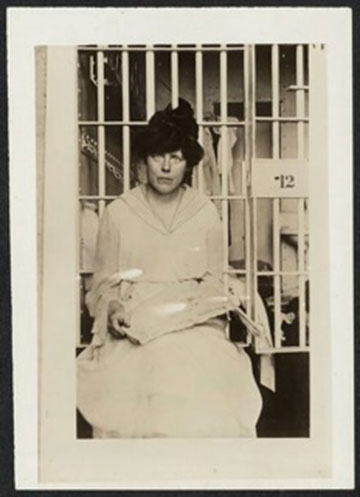
They hurled Dora Lewis into a dark cell, smashed her head against an iron bed, and knocked her out cold. Her cellmate, Alice Cosu, thought Lewis was dead and suffered a heart attack. Additional affidavits describe the guards grabbing, dragging, beating, choking, slamming, pinching, twisting, and kicking the women.
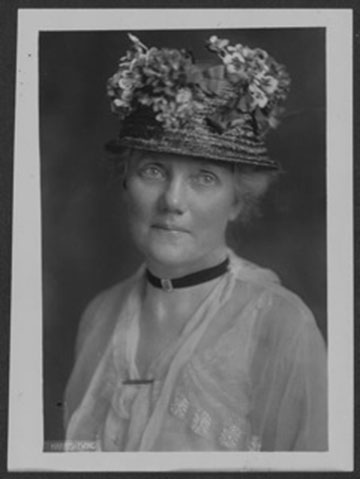
When one of the leaders, Alice Paul, embarked on a hunger strike, they tied her to a chair, forced a tube down her throat, and poured liquid into her until she vomited. She was tortured like this for weeks until word was smuggled out to the press.

Helena Hill Weed, Norwalk, Conn., serving 3-day sentence in a D.C. prison for carrying the banner, “Governments derive their just powers from the consent of the governed.”
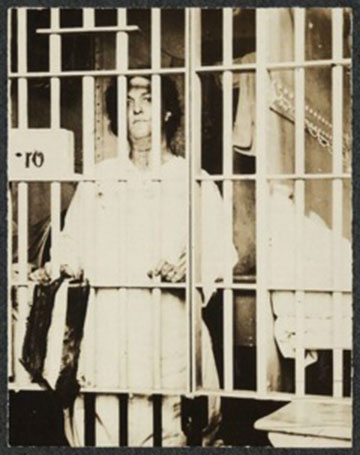
So, some women won’t vote this year because … why, exactly? We have carpool duties? We have to get to work? Our vote doesn’t matter? It’s raining?
Find a copy of the HBO’s movie, Iron Jawed Angels. It is a graphic depiction of the battle these women waged so that we can pull the curtain at the polling booth and have our say. The actual act of voting can become less personal for us, more rote. Frankly, voting can often feel more like an obligation than a privilege. Sometimes it’s inconvenient. What would those women think of the way we use, or don’t use, our right to vote? It is jarring to watch Woodrow Wilson and his cronies try to persuade a psychiatrist to declare Alice Paul insane so that she could be permanently institutionalized. And it is inspiring to watch the doctor refuse. Alice Paul was strong, he said, and brave. That didn’t make her crazy. The doctor admonished the men, “Courage in women is often mistaken for insanity.”
_______________________________________________________________________________________
Oh, and this putting-things-into-perspective post yesterday from chatroom member Mary Beth provides examples of political parties, congresses AND election cycles from years gone by.
Adams against Jefferson: Jefferson painted Adams as a “hideous hermaphroditical character, which has neither the force and firmness of a man, nor the gentleness and sensibility of a woman.” And so Adams labeled Jefferson “a mean-spirited, low-lived fellow, the son of a half-breed Indian squaw, sired by a Virginia mulatto father.”
Andrew Jackson against John Quincy Adams: 1828 – Jackson’s wife was divorced and so was called all sorts of lewd names by his opponents and they labeled Jackson a Jackass. Jackson, in return, claimed that incumbent John Quincy Adams had once tried to offer his maid as a concubine to Russian Czar Alexander I!!!
Johnson against Goldwater – and I remember this one!! It was termed the nastiest of all elections, ever: Johnson systematically destroyed Goldwater’s character with the help of an “after-hours” smear team. It worked — Johnson won one of the most lopsided elections in U.S. history. I remember that Goldwater was good natured and would not go after Johnson in return and paid dearly for it.
And the wildest election I know of was when the Democrat party AND the Republican party tried to get Eisenhower to run for president for their parties. He didn’t have a clue whose side he was on and finally decided that he was a Republican. The Democrats were pretty mad at him for not picking their side. Can you imagine?
So, don’t be discouraged. Just stand for what you know to be right, vote for the person who best gives you SOME value to stand by and know that you have done your part.





















































Thank you for reminding me how great it is to vote.In all the years since I have been old enough to vote,I have missed one election–I had the flu & couldn’t go to vote. I, too, feel that it is such a privilege to vote. I wouldn’t miss it for the world!
In keeping with my comment under the first photo, I would add that all of us need to vote because it is a right that imprisonment and even death has happened in the effort to have equal civil rights! When we don’t vote, we let other agendas prevail and we only have ourselves to thank when we don’t like the way things go.
Amen, sister!
Wow, MaryJane, that was an amazing post. Bravo.
Pingback: Just. One. Word. VOTE. | Raising Jane Journal